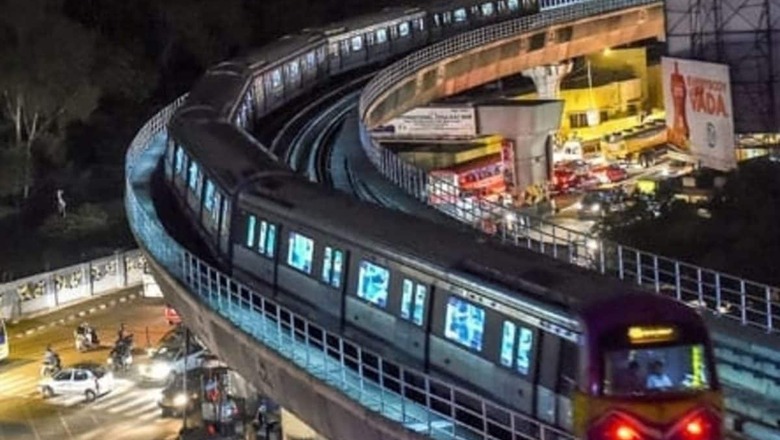
views
Tamil Nadu’s industrial town of Hosur, which shares its borders with Bengaluru, can benefit tremendously if the Karnataka government decides to extend ‘Namma Metro’, the Bengaluru Metro Rail project, by an additional 20 kilometres.
A recent meeting was held between the Krishnagiri (TN) Lok Sabha member A Chellakumar, Karnataka chief minister Basavaraj Bommai, and leader of Opposition Siddaramaiah to discuss the merits of the proposal. Bommai responded positively towards conducting a fact-finding report on the proposal.
Suburban rail expert Sanjeev Dyamannavar believes that any form of transportation should blur geographical lines and should be planned in the interest of the country. Explaining how NCR, Noida, and Faridabad are connected via suburban rail where the Centre also plays an important role in providing funding for this connectivity, Dynamnnavar feels that a suburban rail system would prove to be cheaper and more connected than the Metro rail.
“The larger point that is being missed is that there is already an existing suburban rail system that connects Hosur to all parts of Bengaluru. It would be much more cost-effective to modernise and upgrade the system than the extension of the Metro. The government could even look at building the suburban rail just like the Mumbai local trains,” he said.
With Tamil Nadu positioning the town as the electronics manufacturing and electric mobility hub, the “last-mile connectivity” of Karnataka’s Namma Metro (Our Metro) between Hosur and Bengaluru could prove advantageous to both states. Experts say that on average 10 to 15 thousand employees travel between Hosur and Bengaluru on a daily basis.
Hosur is fast growing into a nerve centre for electric vehicle (EV) engineering and Hosur houses over 4,000 MSMEs. Homegrown industry giants such as TVS Motors, Ashok Leyland, Tata Electronics, and Taiwan’s Delta Electronics have set up massive manufacturing units in Hosur and Krishnagiri with their operations and communications offices in Bengaluru.
“Tata is investing Rs 7,000 crore in building a massive electronic ecosystem that will manufacture platforms for smartphones, including those of Apple Inc, among other components in Hosur under the union government’s Scheme for Promotion of Manufacturing of Electronic Components and Semiconductors (SPECS), reported the Deccan Herald.
Heavy and long travel hours and rising home rents have also forced professionals to look at Hosur as a destination to live and come to Bengaluru to work. The satellite town of Hosur is also a preferred destination for housing for thousands of employees working in Bengaluru’s Electronic City, Bommasandra, and Attibele industrial areas.
Kamal Sahdev, a director of human resources who works with the Taiwan-based Delta Electronics, lives in Bengaluru’s Electronic City and often commutes to the company’s manufacturing plant located in Krishnagiri.
“It takes me an average of 2 hours on the road to travel to the plant. I believe that rail connectivity like the Metro would be a great initiative and help to reduce my travel time and fatigue,” he said.
Srinivas Alvalli is a former techie and now head of civic participation at the non-profit Janaagraha. “Hosur is a buzzing suburban town of Bengaluru like Tumukuru. Now that KRIDE began work on suburban trains, it makes more sense to prioritise suburban trains over Metro for Bengaluru-Hosuru and beyond,” he said. “Suburban train connects to all parts of Bengaluru and integrates with the Metro as well inside the city. For a mega-metropolis like Bengaluru, we need all forms of mass transport— bus, train, and Metro eventually.”
As per Bengaluru Metro Rail Corporation (BMRCL)’s plan, the yellow Metro line has 16 stations, starting at Rashtriya Vidyalaya (RV) Road in South Bengaluru and ending at Bommasandra, located next to Electronic City, which is a major IT/BT cluster of Bengaluru. The cost for the yellow line project is pegged at approximately Rs 1,308 crore.
CM Bommai has promised Chellakumar that his government will give due consideration to the proposal and he would consult with the Bengaluru Metro Rail Corporation (BMRCL) officials on its feasibility.
Read all the Latest News India and Breaking News here




















Comments
0 comment